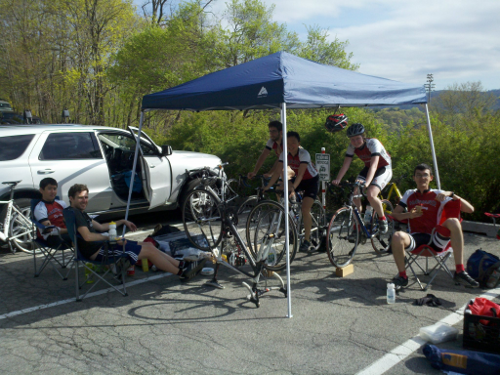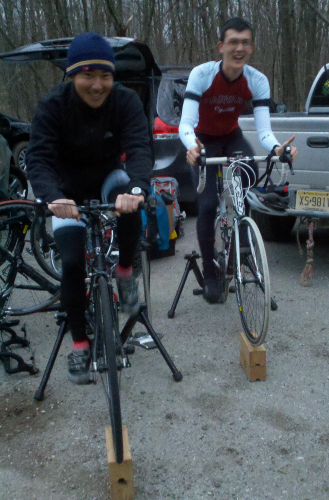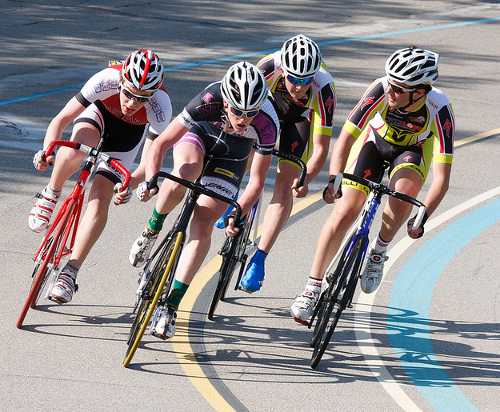Harvard Cycling
a student-run club sport &
the home of bike racing at Harvard University
Racing with HUCA
Harvard races in the
Eastern Collegiate Cycling Conference (ECCC) against other colleges and
universities across New England, New York, New Jersey, Pennsylvania, and
Delaware. We focus primarily on road cycling, which goes from March until
May, but there are opportunities to compete in collegiate track, mountain
biking, and cyclocross races as well.
Why Should I Race?

The team relaxing between races at West Point.
But not only is racing bicycles challenging, it is a lot of fun as well. Just
ask our veterans. While everyone must
ride individually, helping your teammates both on and off the bike is a big
part of success in bike racing, and HUCA excels in this area. Whether it's
pinning numbers onto skinsuits, running to the pit to get a wheel change
after a flat tire, or leading out a teammate in the sprint for victory, your
HUCA teammates will have your back.
Who is Eligible to Race?

Eun Young, Eileen, and Heather at the starting line of the
Princeton road race in 2012.
You don't need any previous racing experience to race with the team. We run skills clinics throughout the fall to teach important racing skills such as drafting, cornering, and sprinting. Each race weekend also has an Intro to Racing category in each event that includes a coaching session with experienced racers. If you already have a lot of bike racing experience, the challenging A category features a very high level of competition, often with local-or domestic-professional caliber riders.
A Typical Race Weekend

Ian and Joel warm up for a hill-climb time trial.
- Individual Time Trials. Often called an ITT for short. In this type of race, riders start individually, at set time intervals, and compete for the fastest time across the course. Riders are not permitted to draft other riders. Courses generally range in distance from two to six miles.
- Team Time Trials. Abbreviated as TTT, in this type of race, you and up to three teammates race may work together (and are permitted to draft each other) to get everyone over the finish line faster than other teams.
- Criteriums. Also known as "crits", these are raced on a short course of around a mile. Racers start as a group and then race for a set period of time, between 20 and 60 minutes. This type of racing tests your technical and handling skills, as the courses usually require lots of cornering, sprinting, and tactics to succeed.
- Road Races. The classic road race, these courses are longer, ranging between 20 and 80 miles depending on the weekend and the race category. These courses often feature challenging hills and test your endurance and climbing skills.
Other Types of Racing
The ECCC also runs collegiate competitions on the track, mountain biking, and
cyclocross. In track racing, riders use a fixed-gear bicycle
and ride around an oval track at a velodrome, riding in a wide variety of
races in a single day. The collegiate season occurs in August and September.

Merrill racing on the track at the velodrome. Photo Credit: Tom
Worster
Mountain bike racing occurs in September and October. There are two types of
racing: gravity and endurance. In gravity events, you race downhill (usually
after riding up in a ski lift) with a specialized bike, while endurance
events use mountain bikes to race on trails after a mass start.
Cyclocross season is in November and December and uses a bike that has
characteristics of both road and mountain bikes. Cyclocross courses feature
difficult and muddy terrain as well as obstacles that require you to dismount
and carry your bike, cheered on by a rowdy crowd. Although most HUCA racers
currently focus on the road, you'll find amongst our members people
passionate about each discipline.
Words to Race By
"Racing is not just for some elite bike gods - it’s fun for everybody. I
have a sticker on the back of my truck, right over the USCF emblem that
says "Try Bike Racing" because I'm convinced that anyone who tries it will
love it.
"Getting started is not all that difficult: just get a bike that fits (you
don’t need a super expensive go-fast bike), ride it enough to reach some
level of fitness and show up for a race. Even if you only last 2 laps you
will get a taste of what it's all about.
"Aside from those basics, if you are participating with the HUCA group, you
have the best possible start. You have a great group of supportive
teammates and some really wonderful coaches who know what they are talking
about and are willing to devote as much time to a beginner as they devote
to a national contender. You can't do any better than that.
"Don’t worry about doing well at first. Participating is what it's about.
Winning is nice, but I’ve never done it (at least not since the 70’s).
Although I’ve been dropped and pulled often enough, nobody has ever given
me a hard time about it. Do it for the challenge, do it for the fun, do it
for yourself."
Have a blast.
Mark Bowen
Coach, 2000-2010
Mark Bowen
Coach, 2000-2010
